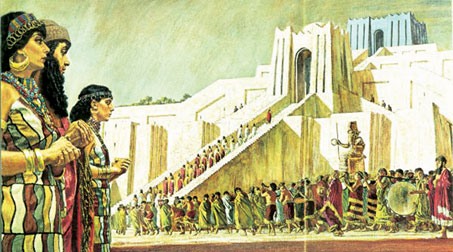New years in the past and the future
New Year in 3011 BC and 7011 AD:
 If we are to accept that the celebration of the arrival of a new year
had begun among the Babylonians, then we have already been having this
festival for over 5000 years. 5000 years from today, would the
descendants of Homo sapiens be celebrating a new year? If we are to accept that the celebration of the arrival of a new year
had begun among the Babylonians, then we have already been having this
festival for over 5000 years. 5000 years from today, would the
descendants of Homo sapiens be celebrating a new year?
In Mesopotamia the festival developed around the first planting of
barley on what could be considered as a new year. This marked the
rebirth of a new season, with the arrival of spring. We have a few
details about these festivals in Mesopotamia, but hardly any information
about any such harvest festivals in Sri Lanka, 5000 years ago.
|

Mespotamian festivities |
Yet we have evidence today that our ancestors too had already
mastered agriculture, were using iron tools and lived in comfortable
houses in village clusters. They had performed religious rituals and
buried their dead with elaborate rituals. Such a society would also have
celebrated their harvest festival, by offering First Fruits to
supernatural beings and developing traditions to welcome a new year.
Going back 5000 years, this is what I saw among the people who lived
in the upper Walawe basin in Sri Lanka. It was the end of March
(according to our present calendar), the time for harvesting the crops
which had been planted during the rainy season. The vegetables and
fruits from the chena cultivations and the paddy and other grains from
the wetland cultivations had been gathered.
The people had to thank the supernatural forces for giving them this
harvest, and then make offerings for a good harvest in the next season.
It was a time of joy, with food aplenty. A time to attend to the upkeep
and renovation of their dwelling places. The hearth was cleaned or
rebuilt, the roof got a new thatch and a fresh mud and dung coating was
applied on the floor. Clay was collected to make new pots and
containers. After these chores were completed, they had time to relax
and enjoy, to have a closer social interaction with their families and
neighbours, to share the food and exchange gifts.
It was an opportunity for the young men and women to get together,
some of them to start new families. The adults too could join the
children in games and singing and dancing. We can still observe some of
these rituals in remote villages in our country even today, as described
by Gunasekara Gunasoma about new Year Celebrations in Panam Pattuwa, by
Thimbiriyagama Bandara about New Year by the Deduru oya basin and in a
wider context, traditions around the island by Mahinda Kumara Dalupota.
This was at a discussion about the New Year, held at the J. R.
Jayawardena Centre on April 4th. Ideas expressed by Hiniduma Sunil
Senevi about the exploitation of the New Year by Big Business led me to
think of the future of the New Year in Sri Lanka. Going forward 5000
years, this is what I could see on this island, known today as Sri
Lanka.
The only way man could survive for another 5000 years was by evolving
into a true human being. He had to change all his evil ways he had
developed during the previous 5000 years. Man in the year 7011 was a
very healthy, happy and contented creature, because he had learnt to
live with nature. He had realized that it was his greed that had driven
him to almost total annihilation and threatened the entire Mother earth.
The New Year festivals as we know it today had no meaning and no
purpose for them. It was New Year every day, a time for joy and
relaxation, a time to interact with not only fellow human beings but
with all other living things while appreciating the natural beauty
around him.
In their minds I could not see any labels of racial or ethnic
identities or religious beliefs. Inequality had long been overcome,
which had eliminated envy, frustration and anger. Thus there was no need
for them to have a special day or a special season to relax, to forget
their daily chores and worries, and for them to begin a new season or a
new year.
Since traditional agriculture had been abandoned long ago, and all
needs of nourishment were manufactured in fully automated factories, man
did not have to toil in the sun and rain, or depend on the weather or
worry about natural disasters. The use of toxic and harmful chemicals in
agriculture, and still more harmful chemicals in animal farming had been
discontinued, and pollution from industries and burning of fossil fuels
had been very strictly controlled, man had become very healthy. There
was no need of medical services. Physical pain and suffering was not
known.
The family as a social unit had also changed. There were no permanent
partners and single parents had become the norm. Human reproduction was
mostly by cloning, thus family affiliations were not very strong. There
was no necessity for any social traditions to maintain or renew family
bonding or close attachments.
I could not see why these fortunate people would ever need to
celebrate a special New Year.
|



